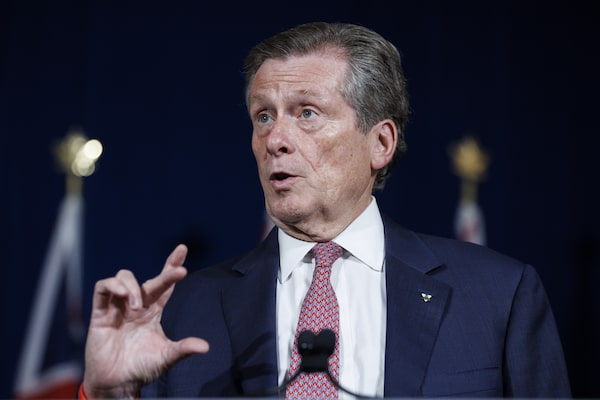
Toronto Mayor John Tory, at Queen’s Park in Toronto on June 27, says he would make 'very, very limited use' of the strong-mayor powers allowed under new provincial legislation.Cole Burston/The Canadian Press
Toronto Mayor John Tory says he would only make limited use of the province’s proposed powers that would allow him to force though certain decisions with the support of just one-third of his council – and Ottawa Mayor Mark Sutcliffe says he wouldn’t use the powers at all.
Critics on the opposition benches and in local governments call the proposal, unveiled by Ontario Municipal Affairs and Housing Minister Steve Clark this week, an assault on democracy and the imposition of “minority rule” in the province’s two largest cities. Mr. Clark says the moves are needed to get more housing approved to address the housing crisis.
Speaking to reporters on Thursday, Mr. Tory said he expects to make “very, very limited use” of the powers. The Toronto mayor, recently re-elected for a third term, said he could use the new powers if efforts to achieve a majority on council failed for key reforms such as allowing rooming houses or more duplexes or triplexes, or for transit or supportive housing projects. (An effort to legalize rooming houses across the city foundered in the last term of council.)
“They can trust me,” Mr. Tory said of Torontonians. “I think they do trust me to exercise all the authorities that I have, as I have done for eight years, in a responsible manner.”
Ontario granted the mayors of Toronto and Ottawa a package of new powers in September, allowing them more control of their budgets and the ability to veto council decisions on designated provincial priorities, which the province has identified as housing and housing-related infrastructure. A mayoral veto could be overturned only with a two-thirds vote. The province has said it intends to extend these powers to other municipalities.
On Thursday, Mr. Tory acknowledged asking the province for even more powers, which he called a “proactive veto,” before the recent municipal election. He did not mention these enhanced powers in public during the campaign.
The mayor did say there was “no clarity as to what was going to be the result of those discussions” until this week. He argued the changes he asked for mirror the powers the September bill gave him over the city budget, which he is required to bring forward. Under the new rules, a two-thirds vote of council is required to overturn him if he vetoes any of council’s proposed budgetary changes.
Mr. Sutcliffe in Ottawa said before the October municipal election that he would not use the province’s stronger mayor powers as then proposed. He said Wednesday in a statement he would not use these new proposed powers either.
The bill introduced on Wednesday at Queen’s Park would also, once passed, give Mr. Clark the power to reappoint the incumbent chairs of three regional governments: Niagara, York and Peel. (Normally, these chairs are chosen by the elected regional councillors.) The bill says the government intends to dispatch “facilitators” to review how these regional governments work. The minister said the appointed chairs are needed to ensure stability as the role of the regions is re-examined.
Despite Mr. Clark’s proposal to name the regional chairs himself, newly elected regional councillors in Niagara, York and Peel still gathered to vote for their chairs on Thursday. In York Region, Mr. Clark’s chosen candidate, Wayne Emmerson, defeated a challenger, Markham regional councillor Joe Li, by a vote of 14-7. Mr. Clark’s chosen Niagara Region chair is Jim Bradley, a former provincial Liberal cabinet minister.
In Peel, Mr. Clark’s pick, long-time local politician Nando Iannicca, was unanimously chosen for another four-year term.
In an interview, Mr. Iannicca said that before the province’s proposed move he thought he could face challengers. But he defended his appointment, saying he would provide stable, experienced leadership as the province pursues sweeping changes to hit its goal of building 1½ million new homes over the next 10 years.
“I am sort of the stay-at-home defenceman. I won’t score the winning goal and I won’t score on our net, you know, one more stable piece of the puzzle while everything else moves around,” Mr. Iannicca said.
The Opposition NDP’s municipal affairs critic, Jeff Burch, accused the Progressive Conservative government of using the housing crisis as a pretense to increase its control over local land-use decisions so that homes can be built on farmland owned by large developers and PC donors. He pointed to the government’s recent reversal of a vow not to touch the protected Greenbelt lands around the Greater Toronto Area.
“This is an assault on democracy,” he said of the strong-mayor powers, warning that allowing mayors to control councils with just one-third of the votes would cause chaos. “One of the rules over the ages of democracy is majority rules, and minority rights.”
With a report from Dustin Cook
Editor’s note: An earlier version of this article misspelled the last name of York regional councillor Wayne Emmerson.
 Jeff Gray
Jeff Gray